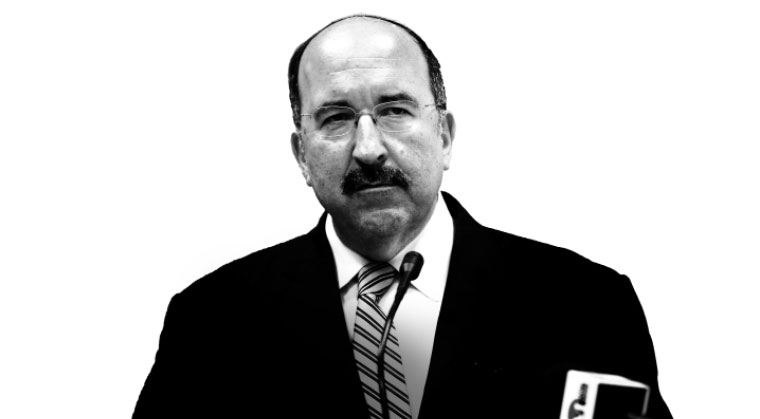A Few Minutes with Dore Gold


D
ore Gold is a former Israeli ambassador to the United Nations and director-general of Israel’s Foreign Ministry. He has been a trusted advisor to Prime Minister Netanyahu and today serves as the president of the Jerusalem Center for Public Affairs, a think tank that specializes in Israeli security and regional diplomacy. Gold came to Washington, D.C., this week to testify at a US House of Representatives hearing on recognizing Israel’s annexation of the Golan Heights.
Is there a willingness in the United States to recognize Israeli sovereignty on the Golan Heights?
I’m not concerned about the Trump administration, which has been very supportive of Israel since it first came into office. My concern is that with the end of the war in Syria, there will be a huge international debate on how best to restructure the Syrian state.
So you think Israeli sovereignty should be a part of the final status negotiation regarding Syria?
It could come up. Once you start dealing with the future of Syria and you have an international framework, the Golan Heights can — I’m not saying it will — but it can become an issue on the international agenda, even though for years it wasn’t.
How might Israel gather bipartisan support for such a move?
Well, I make the point that since 1975, various US administrations have expressed support for Israel remaining on the Golan Heights. I will admit that the language used in [former president Gerald] Ford’s letter and subsequent letters that express support for Israel remaining on the Golan don’t use the term sovereignty, but I don’t know how you remain on the Golan Heights without ultimately having sovereignty.
My point was that the Democratic Party today is further to the left than it was 30 or 40 years ago, so how do you get bipartisan support?
That’s not going to stop us from defending our positions.
We’ve seen a few reports that [Russian president Vladimir] Putin will agree to push Iran away from the Syrian border in exchange for recognizing that Bashar al-Assad is the leader of Syria. Is that the deal as you understand it?
I don’t know of any of these deals. What I do know is that President Putin has achieved a lot in Syria. And I don’t imagine President Putin would want to jeopardize those achievements. One reason that Putin intervened in Syria is that he knew an unstable Syria could threaten Russia internally, for instance if jihadi groups from Syria spread to the Caucasus. I believe that Iran will not be a source of stability, but a source of tremendous instability. Therefore, getting the Iranians out of Syria is not just in Israel’s interest, but also Russia’s.
What is your view on recognizing Assad as the legitimate leader of Syria?
Assad has engaged in mass murder against his own people, and the international community will have to decide what to do. The international courts responded to the mass killings that occurred in the Balkans during the Bosnian war with trials and a special tribunal.
Prime Minister Netanyahu’s policy seems to be that Iran is a bigger problem than Assad.
I don’t think Prime Minister Netanyahu gave [Bashar al-Assad] legitimacy. I think what he wanted to say is that right now the focus of Israel’s problems in Syria is Iran, and that’s where our energy should be placed.
I want to ask you about the peace process. Do you think there is any way to renew negotiations between Israel and the Palestinians?
Israel gave a conditional yes to [former secretary of state John] Kerry’s proposals. President Obama asked Abbas if he supported [Kerry’s] initiative and Abbas said “I’ll get back to you” — and then never did. I tell that story because it seems that [the Palestinians] have no interest whatsoever in any negotiated solution. That’s just the way it is.
So you don’t think we’re going to see peace anytime soon?
I don’t see anything happening on the negotiations front. I think that the Trump plan could introduce new factors that might change Palestinian considerations. There’ll be new issues, new approaches, new thinking about old issues. It might require the Palestinians to come to the table. But with what we had left from the previous administration, there’s nothing there for them to work with.
We have seen that Crown Prince of Saudi Arabia Mohammad bin Salman is introducing reforms and opening up Saudi society. How do you see the future of Israel-Saudi relations?
I think that MBS wants to bring Saudi Arabia into a new era, and he has shown himself willing to take certain risks to follow this course of action. I think the challenge for diplomacy now is to break down the new relations between Israel and the Sunni countries into small, bite-size pieces. You can’t go from no relationship to embassies in one day, but you can take smaller steps. Maybe we can go to conferences together, maybe we can negotiate multilateral agreements, maybe our top policy makers can meet in Europe. So we have to work on these kinds of initiatives that would allow us to have a relationship that is at a more advanced stage than we have now but it isn’t yet full diplomatic contacts, which we may not be ready for. (Originally featured in Mishpacha, Issue 719)
Oops! We could not locate your form.













